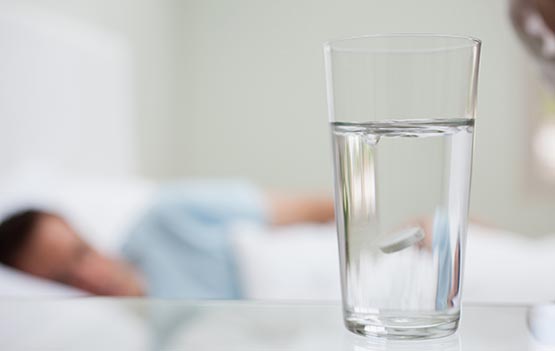

Dry mouth, also known as xerostomia, is the lack of saliva in the mouth causing it to feel parched. Dryness in the mouth can cause discomfort and pain. It can also make it difficult to chew, swallow, taste and even speak. Dry mouth can also lead to health issues because without saliva teeth are more susceptible to plaque formation, tooth decay, and an increased chance of developing mouth infections.
So what causes dry mouth? Dry mouth occurs when the salivary glands are not working properly. Certain medications, radiation therapy, chemotherapy, nerve damage from neck or head injuries, and diseases or autoimmune disorders (such as Sjögren’s syndrome) can all be a cause of dry mouth. Dry mouth symptoms include a dry or burning feeling in the mouth or throat, a rough tongue, frequent thirst, sores in the mouth, split skin at the corners of the mouth, cracked lips and bad breath. If you’re experiencing any of the symptoms above it is important to visit a dentist. Van Dyke General and Implant Dentistry offers oral care in Gainesville, FL.
Saliva contains enzymes that help breakdown food and, along with chewing, it is the start of the digestion process.
Saliva protects tooth enamel and prevents tooth decay thanks to the proteins and minerals it contains.
Saliva controls bacteria and fungi in the mouth to prevent infection, gum disease, and bad breath.
Saliva makes it possible to chew, taste, and swallow.
Saliva not only keeps the mouth comfortable, but it also protects oral tissues from drying out to give them elasticity and keeps food from sticking to teeth and tissues.
Dehydrated woman reaching a glass of water on the bed in the night at home
If you are experiencing dry mouth, a dentist can help you by determining the cause and prescribing the appropriate treatment. Depending on what is causing your dry mouth your dentist might offer one of several types of basic dental care, such as prescribe you medication that stimulates the production of saliva, recommend a change of prescription that might be causing your dry mouth, prescribe an oral rinse, or suggest the use of artificial saliva. If you have dry mouth, try to eliminate drinks with caffeine such as soda, coffee, and tea, avoid sugars as much as possible, and don’t use tobacco or alcohol.
